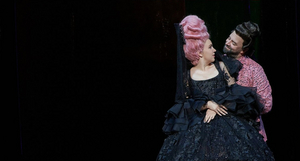IL BARBIERE DI SIVIGLIA Comes to Vienna State Opera Next Month
Performances run 22 September - 15 January.

The barber of Seville introduces himself as the "factotum of the whole city": as a helper in all situations. Like all barbers of his time, he is not only responsible for head hair and beard care, but also for pulling teeth and bloodletting. In addition, Figaro's range of responsibilities includes services for lovers and those wanting to get married, such as transporting secret messages or organizing serenades.
Despite his self-promotion, Figaro's ideas prove to be of little use when he is supposed to help Count Almaviva win Rosina's hand. Rosina namely lives locked up with her guardian Bartolo, who wants to secure her fortune by marrying her himself. All of Figaro's plans for how Almaviva could get closer to his beloved fail - and for the audience - in the most amusing ways. Ultimately, money and power make the Count the winner in this fight, which is only a game for himself but bitterly serious for Bartolo.
Gioachino Rossini's opera was originally called Almaviva, o sia l'Inutile Precauzione (Almaviva or The Useless Precaution) - and the main character was Count Almaviva. However, the audience's adoration quickly focused on the extroverted barber. This contributed to the fact that the great aria of the Count's "Cessa di più resistere" has often been cut because of its length and immense difficulty. In fact, it is not the barber's strategies which escalate again and again, but rather the nobility's means to power that help his love to win.
The opera is based on the play of the same name by Pierre-Augustin Caron de Beaumarchais, which premiered in 1775. He transformed the character types and plot elements of the Italian impromptu comedy, the Commedia dell'arte, first into an Opéra comique, then into a prose comedy that also included impressions of his journey to Spain. Later, the piece became the first part of Beaumarchais' Figaro trilogy.
The opera also owes its enormous stage effectiveness to the libretto by Cesare Sterbini, who provided Gioachino Rossini with ideal music-making events, including one of his famous "crescendo rolls": Bartolo's ally Basilio describes in his »Defamation Aria« in great detail the development of a rumor from a low whisper to the explosion in a "shitstorm!" And in the Finale of Act 1, the opera's text conjures up the image of a "hell forge" that the music delightfully depicts with the sound of hammers and anvils.
Comments

Videos

